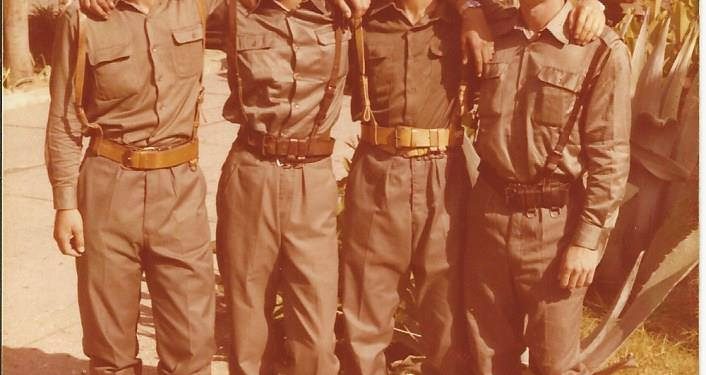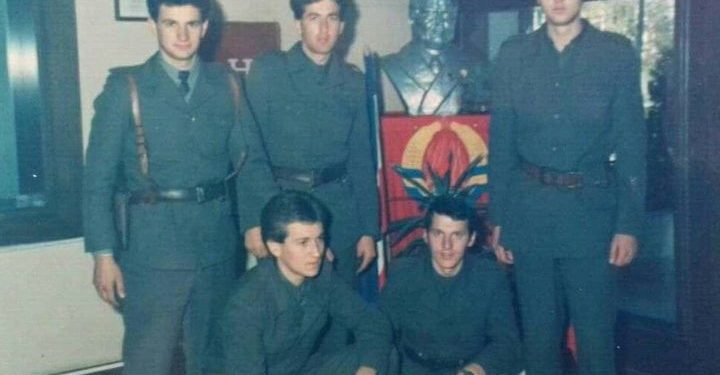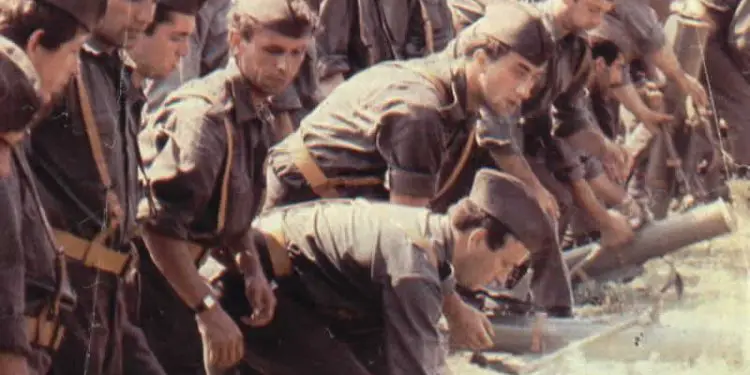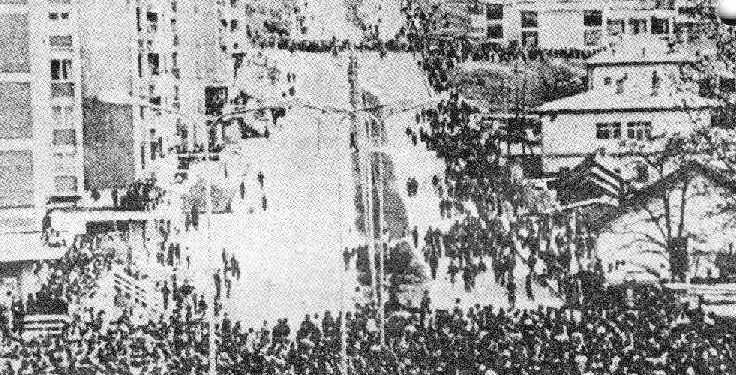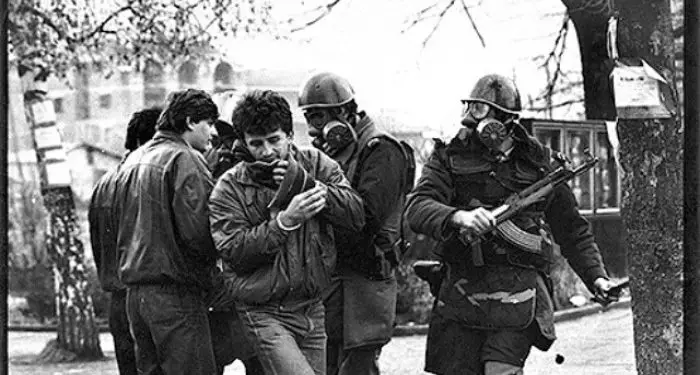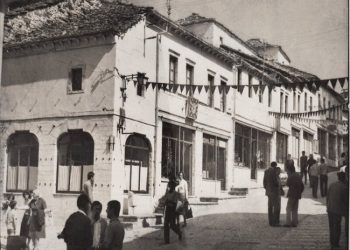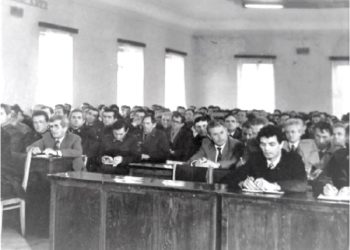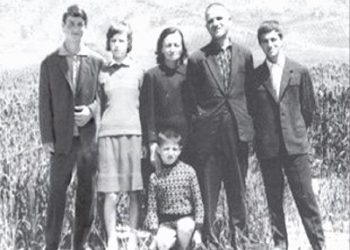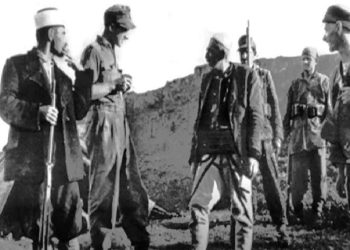By Selim Hasanaj
Second part
Memorie.al / I will write from my memory, even though almost three decades have passed. This is a more or less biographical, personal story in which, with the greatest sincerity and respect, I will also write about other people, that fate may assign us to meet them, to know them and to share our history with them. . I was poor. The only one in the family, I was busy working. This was also the reason why for years I made chalk dodges in the Yugoslav military service, every time I received an invitation. In my heart, I wanted him to never do that service, because I didn’t want to serve the army which, for four decades, had conquered and ruled me. Several times I even thought of injuring myself, so that some handicap or disability would be caused, which would free me from joining the conqueror’s army. God often listens to our thoughts.
Continues from the previous issue
“They didn’t, that’s the rules of the army. Comrade lieutenant, with all due respect to the army and military laws, I can’t do this. I will go to the city and clean myself there, in the public bath of the city. I stuck my leg out and surprisingly I convinced him that he gave me three free hours to go and clean up in the city.
This case became a topic of gossip among the soldiers afterwards. Adem Zekaj told me that, well, I was so stubborn, I asked to be respected as a human being, not to be treated like an animal.
After wearing my uniform, I approached a mirror and surprisingly, I didn’t recognize myself. I had a heart attack. I looked as if those partisans I had seen in the movies, about whom my father had told me, had committed massacres in Drenica and all over the Albanian lands. You promised yourself that, I will do my best, that for no price, I will never complete my duties, as required by the military work regulations, which they called PRAVILLA SLUZHBE.
Not to be glorified today, after so much time, but while I was there in Bihaq, for those three months and days, a course practitioner or, as they called it; “OBUKA”, I managed not to perform any of the tasks or obligations. I complained that my ankle hurts, they sent me to the city hospital, there they diagnosed the injury I had, then they sent me to Zagreb, to the well-known hospital “SHALLATO” and they also said that it would be best if I was released from further service . Mirpo lieutenant Jokanovic, came out with his position on Friday.
Until he was in command of the military unit I was in and until my quarter term was up, I would not be released. Then he would send me to another town and another barracks and, then there, my fate would be decided. He stuck his leg in his, while I limped through the day and did no service.
They took off my shoelaces, put me in the hospital. Fortunately, there were many books there and I spent the day reading. There I learned almost by heart the work regulations and the rights and obligations of soldiers.
This continued until the day three months passed and I was informed that they would send me to Zagreb, because there they would send me to the hospital and heal my leg.
Four days before leaving for Zagreb, a general alarm occurred in our barracks. Even though I was in the hospital, I was forced to go out to the appointed place, which I remember was next to a big oak, which I remember was a hundreds-year-old plane tree.
There was also another soldier who told me he was Slovenian. While he and I were standing and shivering from the cold, we suddenly heard first a rifle crack, then a burst of machine gun.
I saw that from the eastern side of the place where I was standing, a red flame went towards the sky. Several minutes passed, at most 10-15, when the alarm was given to return to the barracks. I came and that Slovenian who, when he saw that I speak Slovenian, was humane and took my arm and helped me to walk limping through that big snow.
I came to the hospital. There were two ambulance cars and an old soldier at the door, not allowing me to enter the room, where I had our weather. “No – he told me – you have to go to your company. An accident has happened and the hospital is busy tonight”.
I had nothing to do, I went there and the caretaker found me a bed, where I slept that night.
The next day they woke us up with the usual trumpet blast and with the same procedure. Right at the door of the room, a junior officer came to us, I think he was an ensign and told us that; after we are cleaned, we must immediately gather on the track, where the commander of the barracks, colonel Rade Llukaq, will inform us about a case.
Everything was done quickly, the minutes flew by and we found ourselves lining up on the track. I sensed a tension in everyone, Lieutenant Jokanovic, came gloomily and silenced them. When he saw the colonel coming, he gave us the command and ordered us to greet the colonel.
Colonel Rade Llukaq took the floor; “Dear soldier, I regret to inform you that an accident happened last night, a friend of yours killed the soldier Dragan Kovačević. After seeing that his friend was dead, the soldier in question committed suicide. This soldier belongs to the Albanian national minority. So we have two soldiers killed”.
Adem Zekaj and I look at each other. If someone stabbed us, not a drop of blood would come out. We realized that it was a terrible game. The colonel then spoke for a few minutes, praising the two soldiers who had lost their lives, but I was impressed by one fact: He did not say the name of the Albanian soldier?!
Those young soldiers who had come with me were all. Who were those Albanian soldiers that we don’t know about?! After two days, from a soldier (Bosnian by nationality), I learned that he was an old soldier, who had another week to complete his service and went to his family. The soldier who told me was an old soldier who worked in the kitchen.
He didn’t know his name, nor what city he was from in Kosovo. But he knew that they had him after our time of service and he was not associated with anyone. He had his own type of dog. Well, there was another surprise. Neither this soldier who told me about the Albanian we killed, nor anyone else, knew the other victim, Dragan Kovačevič…?!
Today, from that distance of time, I don’t know exactly what the date of this case was, but I can make an account. My service started on January 6, 1981. The military course would last three months, that is, 90 days, which means that it was somewhere around the beginning of April 1981.
In the “7 Korriku” Barracks, in Bihac, Bosnia, an Albanian soldier was killed, whose identity none of us young soldiers, who were in that barracks, knew or could never find out…!
NEWS ABOUT THE STUDENT DEMONSTRATION OF MARCH 1981, IN PRISTINA
I purposely gave it the title “Albanian soldiers in Zagreb during the year 1981-1982”, because different events happened there, but since I started my service first in Bihac in Bosnia, I also started this article with my experiences in the Barracks “7 JULY”, in Bihaq.
We, the Albanian soldiers in the “JULY 7” Barracks in Bihaq, had no idea what happened on March 6 in the minds of the students of the University of Pristina. We were given the wake-up call as usual on the morning of March 7, 1981.
After performing the usual duties, which had already become routine for most of us, we were listed in the “TRACK”, where we waited for the tasks and obligations that we had to perform that day.
Lieutenant Milorad Jokanović, lieutenant Rasim Delić, a sergeant, an ensign and a captain of the first class, who was unknown to us, came out of the command offices and headed towards us, who were under the command of a caretaker sergeant.
After the duty sergeant gave the report to lieutenant Jokanovic, the latter took the floor. The guest from Zagreb, captain Ljubomir Cvetkovic, greeted us and introduced himself to us. After that, he told us that after a while Colonel Rade Llukaq would come and give us important information about an event that had happened the day before, in our southernmost province, in Kosmet, namely in its capital, in Pristina .
Adem Zekaj and I were close to each other, while in the row in front of us were Dalipi, Skenderi, Shefketi (Preshevari) and another from a village in Theranda (Prizren), with the last name Dakaj. I don’t remember the name now.
He had been in the hospital at the time I came to serve and I was introduced to him later. He was a wise boy, but he had problems from birth, with his legs, which he had a defect in his legs. After many operations, but not with full success.
So, after Lieutenant Jokanović mentioned Pristina, we Albanian soldiers instinctively looked at each other. These views of ours do not pass without seeing the criminal intent of lieutenant Jokanovic, but also of the guest captain, Cvetkovic.
Colonel Rade Llukaq came at the end. We were given the command; gaditu, you reported to the colonel and after the command; calm down, colonel Llukaq, start talking with a somewhat “sad and mournful” tone!
This was roughly his speech, which they called a speech, while I would call it an announcement!
“Dear fellow soldiers, unfortunately we have an obligation from above, that is, from the Command of the Fifth Army, of which our Barracks is a part, to inform you that yesterday, that is, on March 6, 1981, in the students’ canteen in Pristina, a group of students from the Albanian national minority, rebelled because, according to them, the bad conditions for studying at that University, poor food and some other injustices, that they seem to be doing there.
They protested for several hours and came out with clear demands, as well as the threat that; if they are not met and if their conditions are not improved, they will come out more massively to demonstrate. The protest was dispersed without the need for the police to intervene and everything there is calm and under control….”!
This was roughly what Colonel Rade Llukaq said. When he finishes, let us know that; the soldiers of the Albanian national minority, in this barracks, will have private conversations today, i.e. privately, with captain Ljubomir Cvetkovic, who came all the way from Zagreb, to talk with us.
I was the first to be called and they told me to go to the command and wait there. After me, Adem Zekaj was read and so on. At the door of an office, I was met by captain Ljubomir Cvetkovic, who opened the door and invited me to enter. “I am captain Cvetkoviqi”, he told me.
“I was born in Zhitorax in Nis, I also served in Peja, Gjakova and Skopje. I am the superior of the Military Secret Service of the APJ (People’s Army of Yugoslavia). Please give us a little time, I need to get the biographical and family notes”.
“Okay – I told him, – but you have those notes, you have files for each soldier, and for me too, and it seems unreasonable to repeat them now, but if you want, here is my biography: I am Selim Hasanaj. Kamë was born on July 20, 1955, in Lubozhda, Istog municipality, to father Mustafa Hasanaj and mother, Zyhra Hasanaj. We are workers by profession, in administration with high school education.
I graduated in Kranj, Slovenia, HIGH SCHOOL OF PROFESSIONAL ADMINISTRATION. We are married, expecting our first child, sometime around July of this year, I have two brothers and a sister, all older and younger than me.
Dad is unemployed and so is nana. They are peasants without property and have only a shack house for living. He himself lives in Ljubljana, Slovenia, on the street “CIRIL METODEV” TRG. 17. That’s all he can talk about himself.” mine.
“Okay Selim, tell me why your wife’s last name is Hoxha, not Hoxhaj”?!
“Comrade captain, my wife, her last name is Hasanaj, it seems that you are misinformed”!
“Yes, yes, I am married to you, but the girl’s last name, why is it like that, someone even changed it, from Hoxhic to Hoxha, in October 1980, exactly on October 7. Why did this happen”?!
“Comrade captain, you know that the suffixes ‘iq’ and ‘viq’ do not belong to the Albanian language, they are foreign to our vocabulary, I don’t know who improved my wife’s last name, someone definitely did this from her family, but whoever did this, did well, because he fixed the Albanian surname.
Think that this is neither illegal nor unconstitutional, so I don’t think it’s a topic I want to talk about with you now. National and religious rights are guaranteed by law and the constitution of Yugoslavia, or not”.
“Yes, yes, you are right, I just asked you without any bad intention, you said I know your opinion. And since we are with our wife’s family, can you tell me why one of her brothers is named Enver?! Do you realize that, was this Enver, who liked to remove the suffix that you call ‘IQ’ and now his name appears, what if it was the father of your uncle, Enver Hoxha”?
“Comrade captain, I don’t understand which uncle you are talking about?! My wife has only one uncle, his name is Haxhi, he is an anesthesiologist and now 35 years old, he lives and works somewhere in West Germany. I have neither an uncle nor an aunt, because my aunt was poisoned by the Chetnik KOSTA PEÇANAC, when he was a 9-year-old child, while my father was 7 years old.
Today I keep it as a legacy for his family, which my grandmother had his name. Two of my aunts have died, from the consequences of starvation, which was the result of the monarchist state power of the SKS Kingdom (Mretnia: Serbo-Croatian-Slovenian). I don’t understand you, which uncle are you talking about”!
“You’re right, soldier friend, as the son of a ballista, you don’t know Tito or uncle Enver. But I will do it, let me know.You and I will meet again, run now, you are free and call my soldier, Adem Zekaj”.
I went out and after seeing Adam in the company, with a Serb from Nis, whose name was Zvonko Glišić, I called him and told him that Captain Cvetković was waiting for him. I went to my room, where I passed the time and there I once again read the ‘USTAV SFRJ’ (Constitution of the Socialist Federative Republic of Yugoslavia). Memorie.al
The next issue follows




